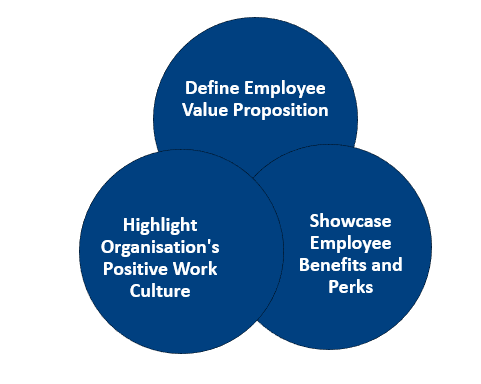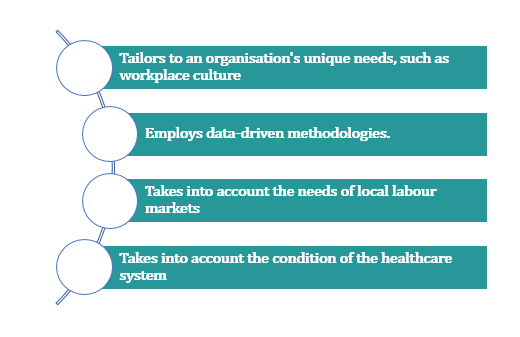Are you looking for information about the strategies for recruiting and retaining the healthcare workforce? In this article, Hospaccx Healthcare Consultancy has mapped all on major points for strategies for recruiting and retaining the healthcare workforce.
INTRODUCTION
Organizations all over the world now place a high focus on attracting and keeping qualified healthcare personnel in the fast-paced modern healthcare sector. Healthcare organisations struggle to find and keep bright people because of the rising demand for high-quality healthcare services and the lack of skilled personnel in many sectors. Effective recruitment tactics are needed not only to draw in quality individuals but also to foster an environment that motivates them to stick around and advance within the company.
Building a solid team that is committed to providing top-notch patient care and supporting the success of the organisation is an important part of recruiting and keeping healthcare professionals. This necessitates a diverse strategy that combines successful recruitment tactics with extensive retention programmes.
STRATEGIES FOR RECRUITING HEALTHCARE WORKERS
1.Utilize multiple recruitment channels: Expand the reach by utilizing various recruitment channels. Engaging with potential candidates through these channels will attract a diverse pool of talent. Examples of some such channels are:
a. Online Job Boards:
- Online job boards are a popular platform for job seekers across industries, including healthcare.
- Utilize both general job boards and specialized healthcare job boards to post your job openings.
b. Social Media Platforms:
- Leverage the power of social media to reach a wide audience of potential candidates.
- Create professional profiles on platforms such as LinkedIn, Facebook, Twitter, and Instagram.
- Share engaging content about your organization, including job postings, employee testimonials, and information about company culture.
- Actively engage with followers, respond to comments and inquiries, and use targeted advertising to reach specific demographics or geographic locations.
c. Professional Networks:
- Create and develop relationships with professional networks that are important to the healthcare industry.
- Attend industry gatherings, conferences, and seminars to meet possible hires.
- Join online forums and communities dedicated to the healthcare industry to network with people who are actively looking for jobs.
d. Healthcare-Specific Job Portals:
- Investigate industry-specific job platforms for the healthcare sector. These portals frequently draw a niche market of healthcare professionals who are actively looking for employment prospects
- By advertising your openings on these sites, you may be able to find applicants who have the particular qualifications and experience you need.
2.Develop a strong employer brand: By providing a supportive workplace environment, employee perks, and opportunities for professional growth, you can position your business to become an employer of choice. Highlight any distinctive features that make your company a desirable place to work.

3. Conducting interviews using technology:
- Virtual interviewing techniques are effective for hiring in the healthcare industry for a number of reasons.
- This is due to the fact that it enables applicants to try out the new position before accepting any offer.
- Additionally, it saves the employing company time and money because less travel is needed as a result.
- By using video conferencing, interviewers can choose a time that suits them rather than having to accommodate travel plans at several locations.
- With the use of this technology, hiring businesses may also assess how candidates present themselves and ascertain whether they will fit into the corporate culture.
4. Focusing on diversity and inclusion in hiring practices:
- Every company needs diversity and inclusion, but the healthcare industry especially needs it.
- This is due to the fact that working with people from many origins, ethnicities, and age ranges is a requirement for those in the healthcare industry.
- Irrespective of their origin or circumstances, healthcare personnel are specifically educated to treat every patient with respect and compassion.
- The best talent capable of providing such care is attracted by firms when diversity is emphasised during the hiring process.
5. Offering internships to students:
- Students can experience what it’s like to work in the workplace through internships.
- They might also assess whether they enjoy the working atmosphere and how healthcare organisations run.
- Internships can also help recruitment officers to identify individuals talented in areas that may not be immediately apparent when interviewing them for full-time roles.
6. Developing a referral programme for employees:
- Motivate your current healthcare staff to suggest qualified individuals by providing referral bonuses or incentives.
- Employees are more likely to suggest qualified applicants who would match the company well.
7. Attend job fairs and industry conferences:
- Attend job fairs and conferences for the healthcare business to network with professionals who are actively looking for jobs.
- This enables you to interact with prospective employees face-to-face and inform them about your company.
FEATURES OF A GOOD HEALTHCARE RECRUITMENT STRATEGY
A good healthcare recruitment strategy pulls in and retains the right personnel. Therefore, it must be founded on a thorough understanding of the needs and strengths of the organisation as well as the market. A good healthcare recruitment strategy may have the following characteristics.

STRATEGIES FOR RETAINING HEALTHCARE EMPLOYEES
- Competitive compensation and benefits:
- Offer competitive salary packages and comprehensive benefits that are attractive to healthcare workers.
- Make sure your compensation plan allows for development and is in line with industry norms.
- Opportunities for professional growth:
- Implement career development programmes that provide healthcare personnel with possibilities for career growth and promotion.
- Access to training, certificates, and programmes for ongoing education will enable individuals to develop their abilities and knowledge.
- Initiatives toward work-life balance:
- Recognise the demands of the healthcare industry and put rules in place to support work-life balance.
- To enhance your staff’s well-being, take into account flexible schedule choices, paid time off, and employee help programmes.
- Wellness Perks:
- As this sector is concerned with people’s health and wellness, it’s crucial to provide benefits for workers’ happiness.
- Benefits related to health can lower stress and prevent burnout. Options that might be presented include:
- Payments for gym memberships and fitness equipment
- Availability of mental health applications
- Free online counselling sessions
- Gift cards for restaurants and groceries
- Supportive work environment:
- Foster a friendly and encouraging work environment where healthcare professionals feel valued and respected.
- Encourage open communication, honour accomplishments, and give staff members chances to offer suggestions and comments.
- Mentorship and professional support:
- Establish mentorship programmes so that seasoned healthcare professionals can lead and assist less-experienced staff members.
- Offer chances for professional development, networking, and teamwork within the organisation.
7. Employee engagement initiatives:
- Provide opportunities for social contact and team development among healthcare professionals.
- To promote a sense of belonging and community, plan activities for the team, recognition campaigns, and milestone celebrations.
8. Gather and Implement Feedback:
- By seeking the opinions of employees, you may demonstrate your concern for their well-being at work and win their loyalty.
- Getting their opinion enables you to pinpoint precisely what you must do to retain employees.
- Make sure to put their advice into practice when they offer their suggestions.
- Some of their suggestions may not be workable. However, it invites discussions about identifying alternative options that might nonetheless be successful.
9. Improve Communication:
- Communication is vital for the success of any organization and it is one of the biggest challenges.
- For healthcare workers who are constantly on the go, working long hours, and usually not at a computer, finding a tool to connect all employees can be tricky.
- A mobile employee engagement app can help fill those gaps, connecting peers and managers right from their smartphones.
CONCLUSION
A major difficulty for organisations in the constantly changing healthcare sector is finding and keeping qualified healthcare employees. Organisations may recruit and keep exceptional personnel who are crucial to delivering high-quality patient care and fostering organisational success by putting in place effective methods.
Healthcare organisations can succeed as an organisation, develop a thriving workforce, and improve patient care by putting these concepts into practice. Keep in mind that the healthcare sector is dynamic, and constant innovation and adaptation are required to draw in and keep the greatest medical specialists in a demanding environment.
For in-depth market and financial feasibility studies or any other healthcare-related research needs, please feel free to reach out to us at +91-8655170700 or email us at hospaccx.india@gmail.com . Our team is equipped to provide comprehensive and detailed insights tailored to your specific requirements.

